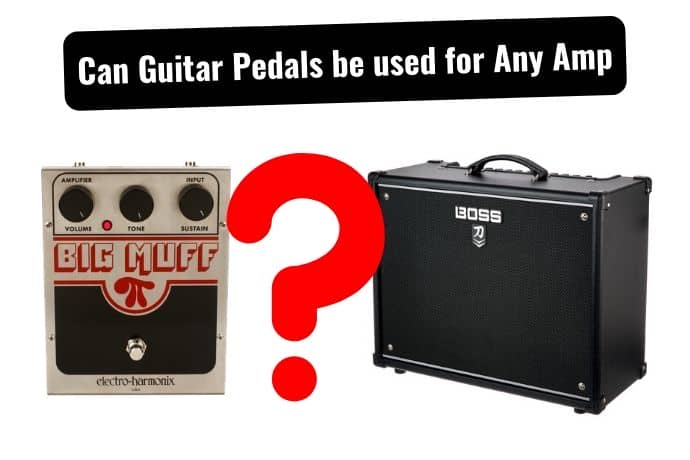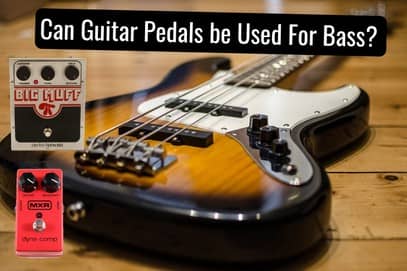
Guitar pedals can provide a staple tone and a wide variety of flavor for sculpting your ideal sound. It’s why I love experimenting with new pedals, sometimes stumbling on a killer tone I like.
Many newbie players ask me whether you can use guitar pedals for any amp?
Myself being a big fan of pedals and trying multiple pedals with different amps, here’s what you need to know.
Nearly all guitar pedals can be used for any amplifier regardless if it’s valve, modeling, or a hybrid amp. You can run guitar pedals through the primary input of the amp or individual pedals into the ‘effects loop’ (usually reverb, delays, modulation) depending on the effect and the player’s preference.
So yes, any guitar pedal can be used for any amplifier. Meaning there’s no limit to the sounds you can create using pedals.
But wait, just because you can, doesn’t mean to slap individual pedals with any amp and expect it to sound good.
Why is this? The answer is that some effect pedals and amp combinations are not optimal together when it comes to tone. Here is an example…
Distortion Pedals with Tube Amps
Tube amps are known for their warn and organic distortion. Hence why tube/valve distortion is considered the ‘golden egg’ and foundation of most guitar players wanting a prestige and organic dirt section in their rig.
Therefore, it makes no sense using a cheap digital distortion pedal in front of a tube amp. Why use a budget digital distortion pedal that colors and masks an organic tube amp tone?
Secondly, most digital distortion pedals try to replicate a valve amp tone just in a digital version.
Therefore, why would you use an artificial version if you have an authentic tube amp distortion at your disposal?
When adopting an expensive tube amp in your rig, players arguably use pedals to complement a sound instead of masking it.
On the other hand, some players like using distortion and overdrive pedals with tube amps.
The argument is pedals seemingly ‘come to life’ that sound more realistic and dynamic through a tube amp compared to a solid-state and modeling amp.
Distortion Pedals with Solid-State Amps
Solid-state amps are known for being more tonally versatile, cheaper, lighter, and more portable than most tube amplifiers.
However, guitar players’ biggest gripe with solid-state amps is their uninspiring and fake distortion tones even with lots of tweaking.
Their distortion tone is notably warm, fuzzy, harsh, and digital compared to the smooth, dynamic, and authentic sound of a tube amplifier.
However, if you are unimpressed with the distortion sound of your solid-state amp, pedals can come to rescue in this instance.
If you are dissatisfied with your amp’s distortion, use a quality distortion/overdrive pedal as your core sound instead of using your amp’s dull distortion.
My Experience with Distortion Pedals
For myself, I own and gig with a Boss Katana 100W solid-state amp. I love this amps versatility and volume from a relatively small transistor amp.
Unfortunately, I am not satisfied with the amps core distortion, even with lots of tweaking and EQ’ing.
As much as I try, I can not dial a solid authentic tone due to the ‘digital’ and ‘fuzzy’ character from my transistor powered amp.
To counter the uninspiring distortion, I drop in a quality distortion pedal as my main dirt sound and much happier with the results when it comes to tone.
Therefore, distortion pedals are undoubtedly useful for this reason adding more flexibility to your rig and help shape and change the sound of your amp if you are unhappy with its core tone.
How Will You use Your pedals?
What you need to decide when choosing an amp when it comes to pedals is whether you will either.
- Use the amps distortion as your main sound and use pedals to enhance and add other effects to add the ‘icing on the cake,’ build a sound around your amps core tone or…
- Adopt your amp as a pedal platform. Amplify a neutral sounding guitar signal and build your core sound using pedals such as distortion, overdrive, or other effects to create your perfect tone.
- A blend of using both the amps core sound and using other pedals to modify and alter the sound to blend certain tones for a unique flavor.
What Amps Take pedals Well?
As we have discussed above, distortion and overdrive pedals can sound and react differently to tube amps and solid-state amps with various tonal results. It all depends on your idea of the ideal guitar tone in your head.
When it comes to other effects such as wah, modulation, reverb, delay, and the various other effects, then most amplifiers tube and solid-state will take these effects rather well with no massive sway in tone.
If you are a guitar player looking to build a guitar tone around your pedals, then a platform amp will be the best option for you? But what are pedal platform amps?
Pedal Platform amps
As the name suggests, “Pedal platform amps” are a term used to describe an amplifier that performs optimally well with pedals, especially drives and overdrives.
These types of amps have a ton of ‘headroom’ for loud shimmering clean tones and pushed into a lush overdrive or distorted sound with pedals providing gain.
They are usually single-channel or two-channel amps with enough wattage for gigging and practice levels.
The main factor why these amps work so well with these pedals is that they include a preamp stage that, when pushed with pedals, is designed to convert your sound from a clean to a tasty distortion/overdrive.
Platform amps take pedals exceptionally well, such as modulation EQ pedals, time effects, and all other effects.
This combination makes them one seamless versatile amp to build an excellent pedalboard tone.
Platform pedal amps enhance the sound of distortion and overdrive pedals to adopt as your original sound.
Similarly, this breed of amplifiers also sound great on their own but are versatile enough to take your pedalboard optimally to build your ideal sound around your collection of pedals.
Related Questions
Can you use pedals with a combo amp?
Yes, you can use pedals with either a combo amp or head and speaker cabinet combination. Both amps circuitry are designed to be used with pedals. Keep in mind, different amp types and brands do react to take pedals better than others.
Can you use guitar pedals for vocals
Yes, you can use guitar pedals for vocals. However, guitar pedals are designed to enhance the mid-range frequencies and not the full range of human voice. Secondly, reverb, delays would be better to adopt than say using distortion and overdrive pedals for voice.
Thanks For Reading
You should check out my related post…can guitar pedals be used for bass?

